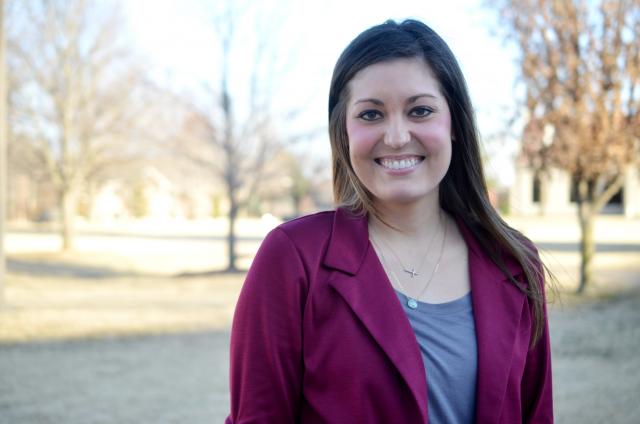![]()
John Brown University women’s basketball player Hunter Glouse experienced a testing of her faith when she was diagnosed with a rare acquired autoimmune disease known as hemolytic anemia.
Despite the fact that Glouse has taken a leave from JBU this semester to recover from her disease, she keeps a positive attitude and strong faith, saying she knows that “it’ll work out.”
In January of 2014, Glouse was a sophomore studying kinesiology and playing as a forward for the Golden Eagles. After she began feeling weak, Glouse was put on medication for strep throat, but she wasn’t getting stronger.
One day Glouse was trying to walk up the steps outside Walker Student Center and had to sit down because she felt dizzy. She then called her mother, Tracy Glouse, who drove two hours from their home in Monett, Mo. to pick up her daughter and drive her to her primary care provider. Mrs. Glouse said that when she first saw her daughter she was surprised because she was “so white.”
Glouse was first diagnosed with mononucleosis, more commonly known as mono, and was expected to be well again in a matter of weeks. However, after running some blood tests, doctors realized that her level of hemoglobin, the protein in blood that transports oxygen throughout the body, was alarmingly low. Doctors told her she was running the risk of organ failure.
Glouse was rushed to the hospital where she received a blood transfusion. Mrs. Glouse recalled that as the transfusion took place, she could see the color coming back to her daughter’s face.
“To see it physically happen before your eyes was kind of an emotional thing,” Mrs. Glouse said.
As it turns out, the mono and the low hemoglobin levels were linked. Mrs. Glouse said that her daughter’s antibodies were fighting off the Epstein-Barr virus that causes mono but for an unknown reason those antibodies began fighting her own blood cells as well, causing a depletion of hemoglobin.
“She’s making the right amount of healthy blood cells, but her body destroys them,” Mrs. Glouse said.
By summer 2014, Glouse was feeling well again. Though her blood levels hadn’t quite returned to normal, they improved greatly.
However, in late November of last semester, the hemolysis, or destruction of red blood cells, started back up again. This time, everyone knew what to expect. Glouse still went to practice and played sometimes, but needed to sit out frequently. Glouse said that while she was never in pain, she needed to sleep more, became easily worn out from exercise, and had to drive two and half hours one to two times a week to get her blood tested and to speak with her doctor.
“My illness got to the point where I was having too many doctor’s appointments,” Glouse said.
The week before last semester’s finals, Glouse, her doctor and her family decided that she needed to take a break from going to JBU in order to heal. Glouse said her teammates and her coaches, Jeff Soderquist and Von Eshnaur, have been very supportive and understanding. Soderquist said he continues to pray with the team for Glouse and keeps up with her through texting. He said she is “constantly still with us.”
While doctors know that mono was the trigger for Glouse’s first episode of hemolytic anemia, this time doctors haven’t been able to figure out the cause. Through various tests, a variety of causes have been ruled out. Within this month, Glouse said she will be taking some final tests to eliminate some more serious causes, like lymphoma. If those tests come back negative, the cause will still be unknown but any serious cause will be ruled out. In that case, she will begin steroid treatment to stop her antibodies from attacking her red blood cells.
Mrs. Glouse said for someone with her condition steroid use is usually 4 to 6 months and then as needed. In fact, after recovering from this episode, Glouse said it is possible that she may never experience hemolysis again or need another steroid treatment.
Glouse said she doesn’t know what her future holds, but right now she’s taking nine hours of online courses at North West Arkansas Community College and focusing on getting better.
Despite this unexpected turn in her life, Glouse maintains a thankful heart and said she counts herself lucky. Glouse explained that the hematology office she regularly travels to shares a waiting room with an oncology office. Here she passes patients receiving chemo therapy and sits next to cancer patients.
“It could be so much worse,” she said.
Glouse said she tries to maintain a positive outlook on life. “I just have to believe everything will work out,” she said.
Glouse’s family and friends describe her as a very positive person.
Brooke Barker was Glouse’s teammate and roommate, and has been Glouse’s best friend for two and a half years. Barker said, “She has a tremendous faith, and knows that God has a plan for her.”
Barker said that Glouse is “very disciplined” in her faith, drawing strength from writing in her prayer journal and reading her Bible daily. Barker said her own faith has been strengthened through her friendship with Glouse.
“She reminds you that He’s always here for you,” Barker said.
Barker said that Glouse’s peace in the face of adversity has eased Barker’s own worries for Glouse and has demonstrated that “you can still thank God and praise God in situations like this.”
“I kind of questioned why this would happen to her but it’s kind of opened my eyes to see that– yeah–He is still good through all of it,” Barker said.
Mrs. Glouse said she is encouraged in knowing that Glouse’s relationship with God is providing her with everything she needs to get through this time.
“She’s going to be fine, no matter what,” Mrs. Glouse said.





